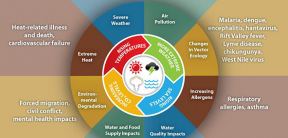This post was authored by Mariella Puerto, Senior Program Officer, Climate, at the Barr Foundation. It originally appeared on the Barr Foundation’s blog and is reposted here with permission.
New data shows Boston hospitals have cut their energy use by six percent over the last three years, despite continued facility growth. These reductions have not only saved the hospitals $12 million—they have helped put Boston on track to achieving its ambitious climate goals.
With more than 30 million square feet of real estate that consumes, on average, two and a half times as much energy as typical buildings, Boston’s health care sector has a massive carbon footprint. Indeed, without the active support of healthcare, there would be little hope for Boston to achieve its ambitious climate goals.
Thankfully, Boston’s health care sector is full of champions who are leading by example, making major investments to increase efficiency, working collaboratively to share what’s working, and encouraging their peers to follow their lead.
Results thus far are impressive. The health care sector typically sees a 1.5 percent annual increase in energy use (due to expansions in physical plants and energy-intensive medical technologies). However, from 2011 to 2013, the sector in metro Boston actually reduced its total energy use by six percent—thanks to significant investments in energy efficiency. This reduction is equal to eliminating the annual greenhouse gas (GHG) emissions of nearly 7,500 passenger vehicles. What is also remarkable is that the hospitals in the region joined forces to gather this data, which is the first of its kind in the nation. Through these reductions, hospitals have avoided $12 million in energy costs—enough to pay for health care services for more than 1,000 Massachusetts Medicare enrollees.
Two important factors helped catalyze these new ways of working. One is the Green Ribbon Commission, a group of more than thirty business and civic leaders who came together in 2010 to help Boston implement its Climate Action Plan (and which I profiled in an earlier post: “The Biggest Team Effort in Boston History”). The other key factor has been a Green Ribbon Commission working group focused on health care, co-chaired by Gary Gottlieb, president and CEO of Partners Health Care, and by Kate Walsh, president of the Boston Medical Center. With the help of the nonprofit Health Care Without Harm, which Barr supported to facilitate this working group, Gottlieb and Walsh have engaged the CEOs of more than twenty hospitals and their facility directors to share strategies for increasing efficiency in energy and transportation. The group has also fostered collaboration among energy utilities and state policymakers to develop approaches and programs that enable health care facilities to make the deepest improvements possible.
To learn more about this exciting work, check out this new, five-minute video featuring Health Care Without Harm and many of the participating hospitals.
You can also read these recent articles praising Boston hospitals for their leadership in GHG reductions:
Mariella Puerto is a senior program officer for Climate, managing the Barr Foundation’s grantmaking and other initiatives that catalyze the transition to a clean-energy economy. Born in Malaysia of Filipino, Chinese, and Thai heritage, Mariella immigrated to the United States in 1986. She earned her bachelor’s degree in political science from Brandon University in Manitoba, Canada, and her master’s degree in political science from Ohio University.


